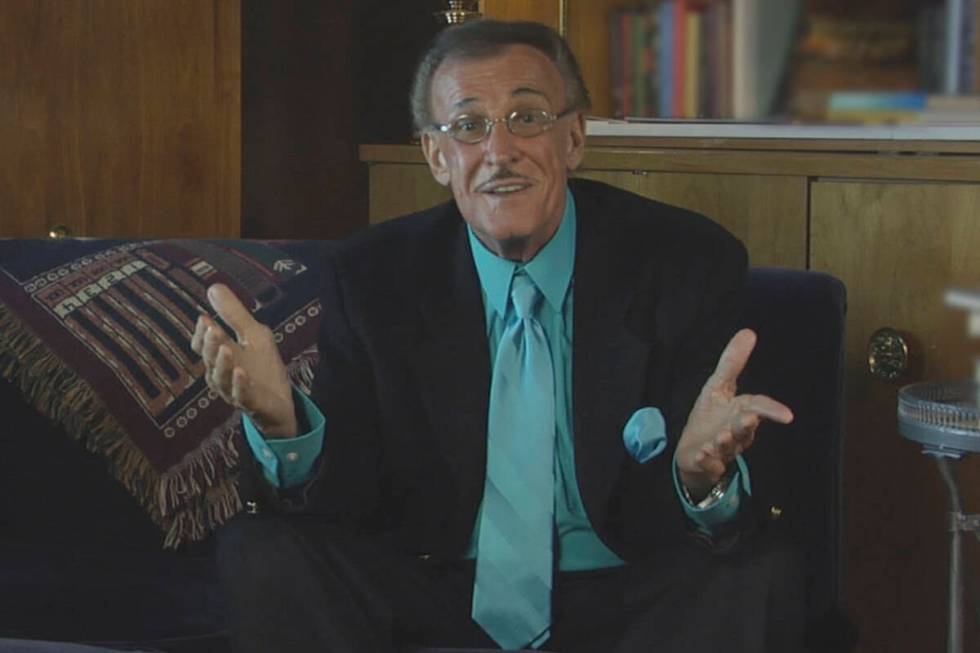New true(ish)-crime series introduces ‘the Cocaine King of Las Vegas’

AJ Pratt may be the Forrest Gump of organized crime.
Or, possibly, its Sidd Finch — the Mets pitching prospect and French horn enthusiast George Plimpton invented for Sports Illustrated.
The docuseries “The Tailor of Sin City” (10 p.m. Thursday, SundanceTV) follows Pratt as he builds a clothing business in Wichita, Kansas — then leaves it all behind in 1969 for a move to Las Vegas.
It isn’t long before he’s rubbing elbows with the city’s top mobsters and entertainers. Name a celebrity or a criminal — or even a celebrity criminal — from that era, and Pratt seems to have a connection.
As told through a series of filmed and audiotaped interviews, the late Pratt says he worked with Kansas City mob boss Nick Civella, his underboss Carl “Tuffy” DeLuna and “Folies Bergère” producer Joe Agosto, who oversaw their skim from the Tropicana. He also became friendly with Tony Spilotro and designed suits that made the mobster’s diminutive frame appear taller.
When he wasn’t outfitting the Outfit with designer threads, Pratt says he was making clothes for Tom Jones, Wayne Newton and Elvis Presley — the latter of whom, Pratt says, asked to meet him because Presley liked the way he dressed.
At one point, a customer at Pratt’s Las Vegas shop invited him to sit down with Pablo Escobar in Colombia. That trip eventually led to Pratt launching a drug smuggling operation with Barry Seal, the pilot portrayed by Tom Cruise in 2017’s “American Made,” and becoming, in the words of the press materials for the series, “the Cocaine King of Las Vegas.”
Pratt also says he smuggled silk out of Shanghai during an embargo so he could make costumes for showgirls and that he brokered the deal to sell the Tropicana to Ramada Inns by agreeing to fill the Ramada representative’s airplane with pure Colombian cocaine.
The only problem? There’s no way to verify how much, if any of this, is true.
“There’s some stories,” Sal Manna says in the series, “that I find extremely hard to believe, that may be exaggerations, may be self aggrandizements, may be out-and-out lies.” Then Manna, who wrote with Pratt the book on which this is all based, says he would find “a glimmer of a fact” in his research that backed up some of what Pratt told him.
“AJ could make you believe anything that he told you,” his brother David Pratt says, just before one of the over-the-top stories is mostly disproved.
“The Tailor of Sin City” also speaks with Pratt’s friends and his third and seventh wives. One of the few outside sources is Michael Green, associate professor of history at UNLV.
Green tells the Review-Journal he’d never heard of Pratt until contacted by the production. When Green asked around, his contacts “who would’ve been around back then” weren’t aware of Pratt, either. But, Green says, they “tended to think ‘Yeah, something like that could happen here.’ ”
The Review-Journal’s digital archives go back to 1929. Pratt’s name doesn’t turn up once — not as a businessman, nor as a suspected criminal. There isn’t so much as an advertisement for his shop or his services.
“That doesn’t surprise me, either,” Green says, noting that word-of-mouth advertising once ruled Las Vegas. “I have become immune to surprise around here.”
When confronted by Manna with evidence that contradicts one of his wildest claims, Pratt responds that, well, that was the way he remembered the event happening.
“It’s a memoir, not a biography,” Manna says in the series. “It’s his story the way he sees it.”
Contact Christopher Lawrence at clawrence@reviewjournal.com or 702-380-4567. Follow @life_onthecouch on X.